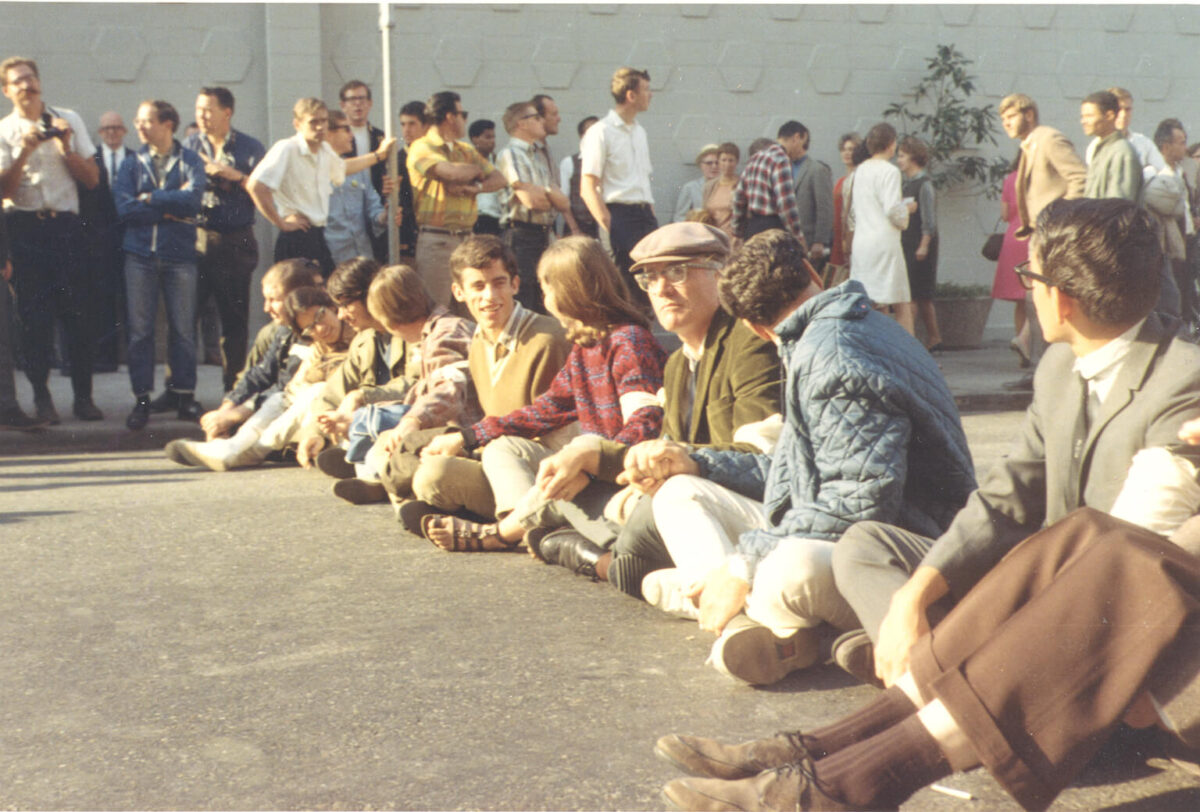Words by Johanna Harlow
Once upon a time—1955, to be precise—a man with big ideas opened a small independent bookshop. The man was called Roy Kepler; the shop, Kepler’s Bookstore. And it wasn’t long before this ardent owner and peace activist started attracting the like-minded to his little store. At Kepler’s, inquisitive minds and restless spirits found a place that welcomed the sharing of ideas and social causes. The shop harbored Stanford staff and students, Beat intellectuals and pacifists—even celebrity patrons like singer/activist Joan Baez and the Grateful Dead’s Jerry Garcia. Former President Jimmy Carter stopped by for a visit.
Progressive Roy also helped popularize the paperback. Back then, many “serious” booksellers refused to carry these soft-covered books, resolved to have no association with lowbrow, penny dreadful shenanigans. But while some saw trouble, Roy saw the future.
Roy has long since passed away—but the bookstore he built perseveres. This May, it reaches the venerable age of 70. To commemorate this anniversary, Keplerites share their memories of its milestones. What could be more fitting than to celebrate this seller of stories with a few fond tales? Find your squishiest armchair and settle in for storytime at Kepler’s.
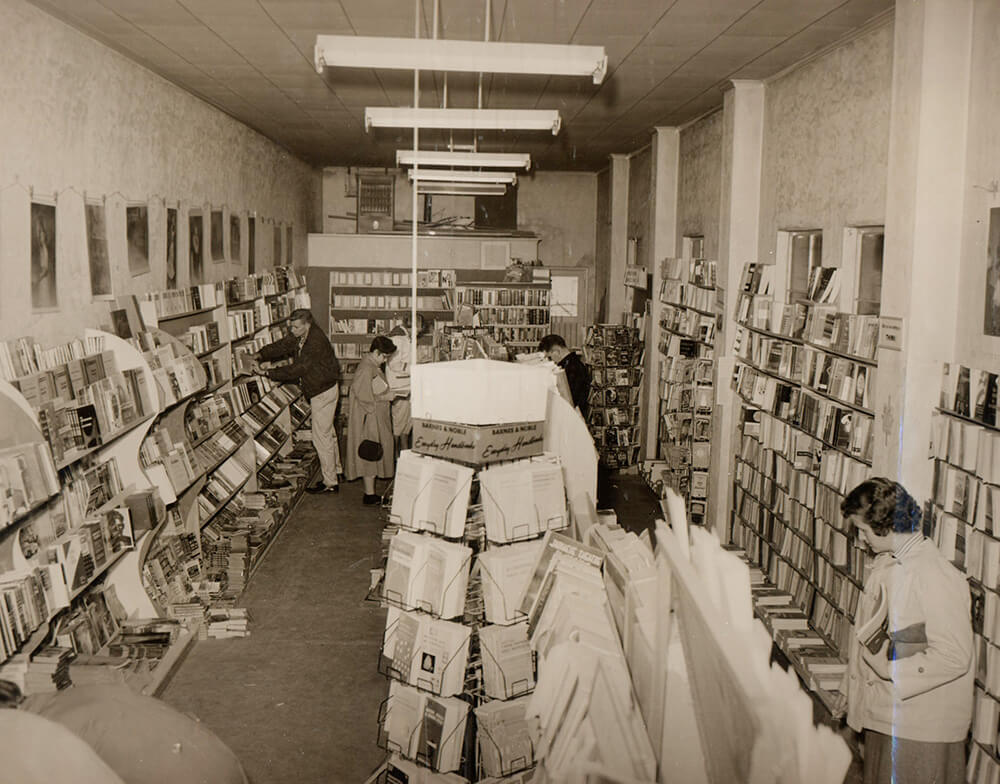
A Childhood Among The Shelves: Dawn Kepler
The smell of coffee always draws Dawn Kepler, oldest of Roy’s children, back to the bookstore. “My dad, coming out of the beatnik era, thought that a little coffee bar was important,” she reminisces. Though as a child, she admits being more preoccupied with the store’s display case of gracefully-layered baklava and brightly-colored sodas. “All of these were forbidden fruits at home. My mother didn’t believe in sugar,” Dawn says. But at the store, Dad always let the kids pick out a treat.
Dawn’s appetite for books rivaled her sweet tooth. She feasted on the written word while perched on the bookshelf’s edge, keeping as close as possible to the source. “There were chairs. There was even a sofa. But I would just sit right down there,” she laughs.
So bookish was Dawn that she once tried reading on a river trip. “(The book) came home with me four times its original size—because it was pulp,” she chuckles. On another occasion, she got in trouble for reading while cycling. “It was very safe,” Dawn wryly protests. “I had a basket on my bike. I had propped my book up on it, and I put my sweater in to hold it open.”
Dawn’s dad was also a creative problem-solver. She recounts the time Roy moved Kepler’s entire inventory to its new location via shopping carts from the grocery store down the street. “I don’t know how dad wrangled that, but my father always did deals. ‘What would help you? What would help me?’”
“It was fun to live in a bookstore,” Dawn says. Today, she runs Kepler’s Facebook page, an account she’s grown to 23,000 followers. “It’s my connection to my childhood,” she explains.
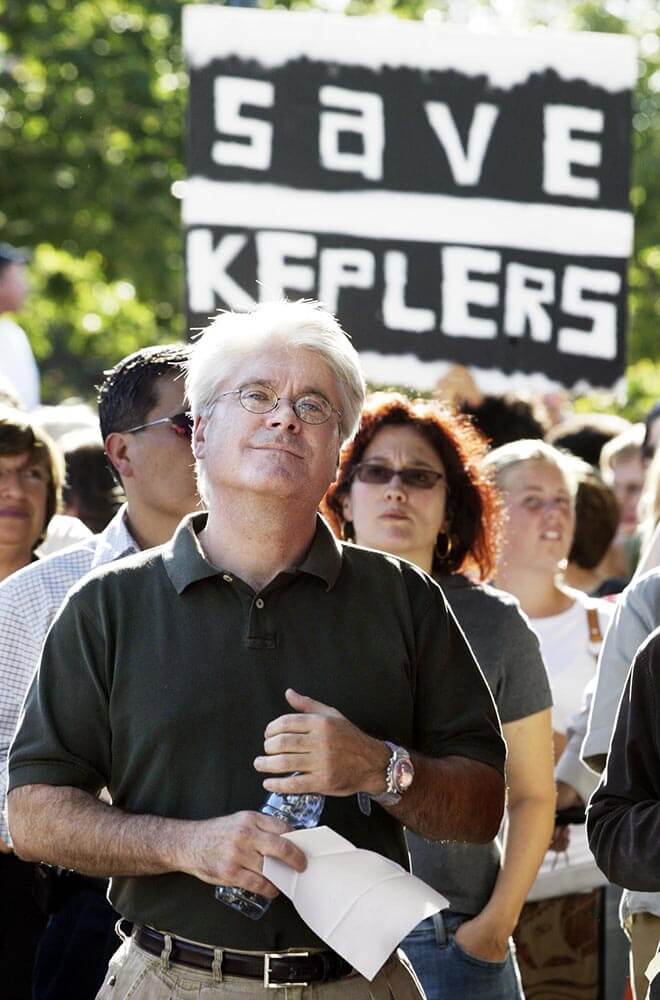
Larger-than-life Characters: Clark Kepler
Early Kepler’s employees knew Roy’s son Clark as the little boy with the Mad Magazine obsession and the black feet. Back when the store did business out of a converted auto body shop in the 1970s, “the cement floors were still stained with oil,” Clark recalls. “And people were also smoking and throwing their butts on the ground.” He also remembers the store’s larger-than-life characters, like its first employee, Gandhi scholar Ira Sandperl, who “probably held court at the bookstore more than he actually worked.”
In the ‘80s, Clark took over running the store. “I was at Sierra College when my dad asked me to come work a summer for him,” he recalls. “That summer got extended to 33 years.” During his time at its helm, Clark weathered plenty of highs and lows. There was the store’s devastating closure in 2005—and the community’s herculean efforts to revive it. On reopening day, people came in droves to support Kepler’s. Dawn baked her father’s favorite sugar cookies, handing them out to customers as they waited in a checkout line that stretched out the door. “That whole experience was life-changing and humbling,” Clark says.
Of the many events Clark has hosted at its current location downtown, the Harry Potter book releases have been among its most popular. Over the years, the festivities have ranged from scene reenactments to tales with Hagrid in the Gryffindor Common Room to Diagon Alley-themed stalls. Cafe Borrone transformed into the Death Eater Enclave, cheerfully serving macabre treats. (Cockroach clusters, anyone?) And many dressed up—including a memorable Moaning Myrtle costume that involved a toilet seat around the wearer’s neck.
“Every time you open a book, you’re entering a world, somebody else’s world—and you’re doing it with your imagination, not with your eyes or ears only,” muses Clark. “When your imagination is involved, it resonates much deeper.”
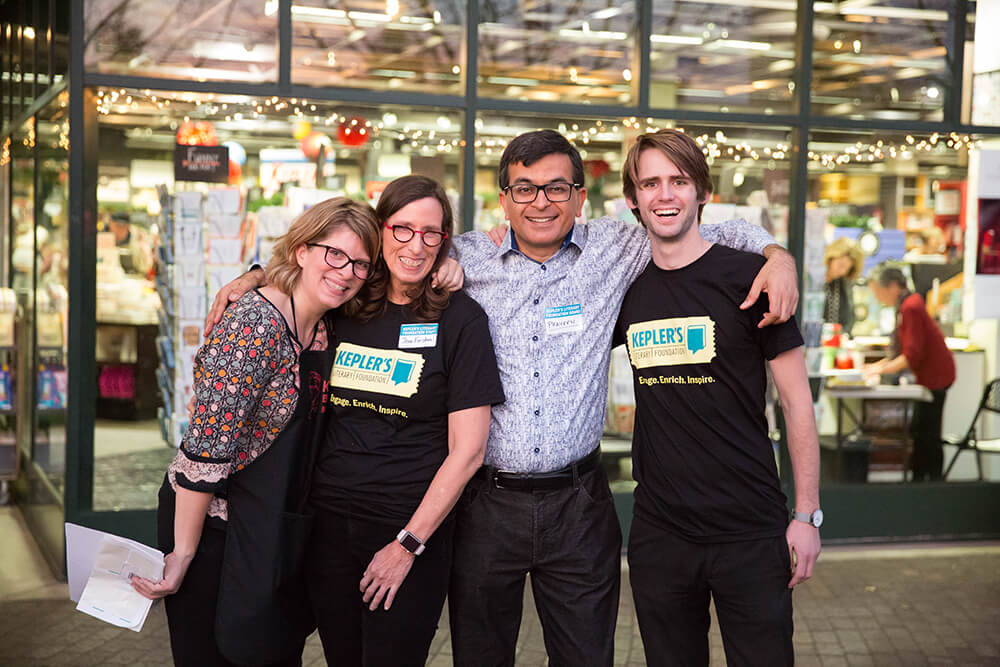
The Next Generation: Praveen Madan
Kepler’s current CEO Praveen Madan had not been in the book business long when Clark handed him Kepler’s reins. In India, “public libraries were terrible,” Praveen recalls of his childhood. “We didn’t have great access to books.” Excluding textbooks, he didn’t own his first tome until after college. “One of the first things I did with my first paycheck was buy a few science fiction books,” he recalls. Stepping into an American Barnes & Noble for the first time blew his mind.
But after moving to the States for an unfulfilling career in management consulting, Praveen underwent a crisis. “I started having this unease,” he recollects. “Was it really worth my one and only life?” Somehow, he and his wife found themselves revamping The Booksmith, a longstanding San Francisco bookstore. “I was fascinated by this dilemma,” Praveen says of the plight of the 21st-century bookstore. “What can possibly be done to evolve the business model of a bookstore so it stays relevant?” It tickled his problem-solving brain.
So a few years later, when Clark told Praveen of his plans to either pass Kepler’s on to the next generation or close it for good, Praveen wasn’t deterred by the store’s declining sales. He said yes. “It was touch-and-go for a while,” Praveen admits of the intense restructuring process. Understanding that bringing this conversation to the community would be essential, he hosted a conference and asked publishers, book sellers, authors, donors, staff and customers to help him reimagine the thriving community bookstore of today. “A lot of times, we have an instinct to try to control an outcome or make a certain decision—but often it’s better to listen, let things evolve.”
One change to Kepler’s has been its hybrid model and the addition of its nonprofit events branch. At one speaking event with Supreme Court Justice Sonia Sotomayor, Kepler’s gave free tickets and books to 120 high school kids (many from East Palo Alto and Belle Haven), then arranged a backstage meeting for them. “One young girl said to her that she was hoping to become a lawyer and eventually a judge,” Praveen recalls. “And Sonia Sotomayor said to her, ‘You call me, and I will personally swear you in.’ I still tear up thinking about that.”
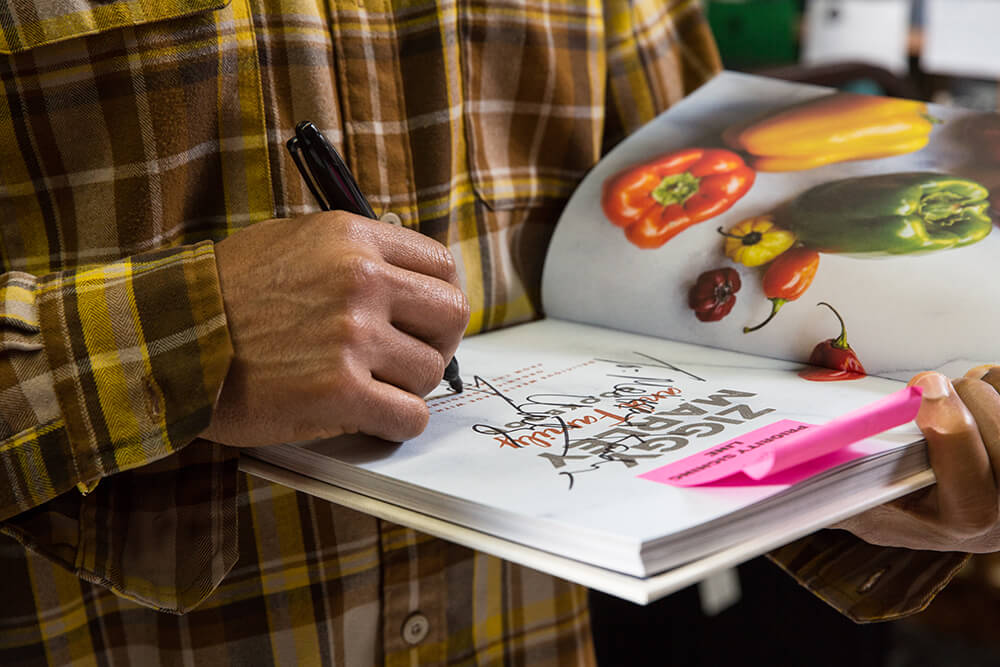
Bookworm’s Haven: V.R. Ferose
When V.R. Ferose, author and head of SAP Academy for Engineering, visits a new place, he has a tradition. From Tokyo to Dubai, “one of the first things I do is check out the independent bookstore,” he says, adding that he can tell a lot about a country based on its bestseller list. “It’s basically a reflection of the conversation that people are having … What is a priority for them?”
As soon as Ferose walked into Kepler’s, he knew this place was extraordinary. “It stood for community, it stood for a larger good—and it continues to do that,” Ferose explains. Since then, Ferose has attended countless author’s events and booked Kepler’s speakers at SAP. The affection is mutual and Kepler’s carries Ferose’s books. One of his most recent, The Invisible Majority, explores the resilience of “India’s abled disabled” and includes a foreword from the Dalai Lama.
His most recent collaboration with Kepler’s—and with Oscar-nominated director Doug Roland—is a documentary film titled Reimagining Independent Bookstores. “All the documentaries that I have seen about bookstores have been looking backwards. They are seeing bookstores from the lens of nostalgia … I wanted to turn that around and say, ‘What does a future bookstore look like?’” Ferose explains. Naturally, Kepler’s was his first filming location.
If anything competes with Ferose’s love of books, it’s signed books. As a serious collector—with signatures from Martin Luther King Jr., Mahatma Gandhi and the last 11 presidents—many of Ferose’s 3,000 autographed copies come from his favorite Menlo Park bookstore. “My wife is not amused that I’m using all the wardrobes to keep books,” he chuckles.

A Family Affair: Amanda Hall
“Kepler’s isn’t just a retail store,” muses the bookstore’s COO Amanda Hall. “Yes, we sell books, but it’s really a place to gather, to share information, to learn, to grow up.”
People even fall in love here. Recently, Amanda saw a couple who’d spent their first date bantering and browsing the bookstore return to Kepler’s to pose for engagement photos. “We are a part of family traditions,” adds Amanda, remarking that she sees a large number of families visit the day after Thanksgiving—right after a big breakfast at Cafe Borrone.
Amanda’s own daughters have made many memories here. “They grew up in the bookstore,” she says, recalling her older daughter’s thrilling encounter with Hunger Game’s Suzanne Collins at an event. “Authors in our world are rock stars.”
Amanda’s younger daughter, a big fan of the Babymouse series, also got to meet her idol. “I would say she was a reluctant reader, and these silly graphic novels were what started her love of reading. So for her to get to hang out for a day with Jennifer L. Holm, with a cupcake crown, and be a part of the event and the reading, that was amazing.” In later years, both daughters would come to work at the store.
People may have come and gone from Kepler’s, but there’s one constant: its staff has faithfully tended the bookstore’s flame, keeping it shining from one generation to the next. Thanks to them, patrons old and new are still finding books that expand their horizons, 70 years after Roy Kepler opened its doors. “It makes you feel honored to be the steward of something that is so important to them,” says Amanda. Your last name doesn’t have to be Kepler to be a part of this ever-growing bookstore family.


